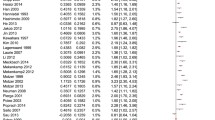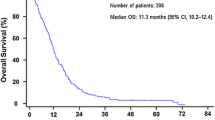Abstract
Objectives
To evaluate the usefulness of tumor-marker measurements and to identify prognostic factors in patients with cancer of unknown primary (CUP), receiving platinum-based combination chemotherapy and to verify the adjustment of previously reported prognostic models in this population.
Methods
We conducted univariate and multivariate analyses in consecutive patients with CUP receiving platinum-based combination chemotherapy. Previously reported prognostic models were then validated in this population.
Results
A total of 93 patients were analyzed and the response rate to platinum-based chemotherapeutic regimens among the 93 patients was 39.8%. The median time to progression and overall survival period were 4.1 and 12.4 months, respectively. The ST-439 level was significantly higher in patients with histologically confirmed adenocarcinoma than in patients with poorly differentiated adenocarcinoma or poorly differentiated carcinoma. A multivariate analysis indicated that performance status, the number of involved organs, and the serum lactate dehydrogenase level were the prognostic factors of the outcome. Both the previously reported prognostic models for predicting the duration of survival in this population were shown to be valid.
Conclusion
Tumor-marker measurements are not helpful in the management of patients with CUP. Previously reported prognostic models may be useful for selecting indication for chemotherapy or for stratifying the patients in clinical trial.



Similar content being viewed by others
References
Abbruzzese JL, Abbruzzese MC, Hess KR, Raber MN (1995) Analysis of a diagnostic strategy for patients with suspected tumors of unknown origin. J Clin Oncol 13:2094–2103
Briasoulis E, Kalofonos H, Bafaloukos D, Samantas E, Fountzilas G, Xiros N, Skarlos D, Christodoulou C, Kosmidis P, Pavlidis N (2000) Carboplatin plus paclitaxel in unknown primary carcinoma: a phase II Hellenic Cooperative Oncology Group Study. J Clin Oncol 18:3101–3107
Canil CM, Tannock IF (2002) Doctors dilemma: incorporating tumor markers into clinical decision making. Semin Oncol 29:286–293
Culine S, Kramar A, Saghatchion M, Bugat R, Lesimple T, Latholary A, Merrouche Y, Laplanche A, Fisasi K (2002) Development and validation of a prognostic model to predict the length of survival in patients with carcinomas of an unknown primary site. J Clin Oncol 20:4679–4683
Currow DC, Findlay M, Cox K, Harnette PR (1996) Elevated germ cell markers in carcinoma of uncertain primary site do not predict response to platinum based chemotherapy. Eur J Cancer 32A:2357–2359
van der Gaast A, Verweij J, Planting AST, Hop WCJ, Stater G (1995) Simple prognostic model to predict survival in patients with undifferentiated carcinoma of unknown primary site. J Clin Oncol 13:1720–1725
Greco FA, Hainsworth JD (2005) Cancer of unknown primary site. In: Devita VT (ed) Cancer, principles and practice of oncology. 7th edn. Lippincott, Williams&Wilkins, Philadelphia, pp 2213–2236
Greco FA, Burris HA 3rd, Erland JB, Gray JR, Kalman LA, Schreeder MT, Hainsworth JD (2000) Carcinoma of unknown primary site. Cancer 89:2655–2660
Hainsworth JD, Johnson DH, Greco FA (1992) Cisplatin-based combination chemotherapy in the treatment of poorly differentiated carcinoma and poorly differentiated adenocarcinoma of unknown primary site: result of a 12-year experience. J Clin Oncol 10:912–922
Hess KR, Abbruzzese MC, Lenzi R, Raber MN, Abbruzzese JL (1999) Classification and regression tree analysis of 1000 consecutive patients with unknown primary carcinoma. Clin Cancer Res 5:3403–3410
Koch M, McPherson TA (1981) Carcinoembryonic antigen levels as an indicator of the primary site in metastatic disease of unknown origin. Cancer 48:1242–1244
Miller AB, Hoogstraten B, Staquet M (1981) Reporting results of cancer treatment. Cancer 147:207–214
Milovic M, Popov I, Jelic S (2002) Tumor markers in metastatic disease from cancer of unknown primary origin. Med Sci Monit 8:MT25–MT30
Pavlidis N, Kalef-Ezra J, Briassoulis E, Skarlos D, Kosmidis P, Saferiadis K, Bairaktari E, Bafaloukos D, Maravegias A, Theoharis D, Fountzilas G (1994) Evaluation of six tumor markers in patients with carcinoma of unknown primary. Med Pediatr Oncol 22:162–167
Pavlidis N, Briasoulis E, Hainsworth J, Greco FA (2003) Diagnostic and therapeutic management of cancer of an unknown primary. Eur J Cancer 39:1990–2005
Therasse P, Arbuck SG, Eisenhauer EA, Wanders J, Kaplan RS, Rubinstein L, Verweij J, Van Glabbeke M, van Oosterom AT, Christian MC, Gwyther SG (2000) New guidelines to evaluate the response to treatment in solid tumors. European Organization for Research and Treatment of Cancer, National Cancer Institute of the United States, National Cancer Institute of Canada. J Natl Cancer Inst 92:205–216
Varadhachary GR, Abbruzzese JL, Lenzi R (2004) Diagnostic strategies for unknown primary cancer. Cancer 100:1776–1785
van de Wouw AJ, Jansen RLH, Griffioen AW, Hillen HFP (2004) Clinical and immunohistochemical analysis of patients with unknown primary tumor. A search for prognostic factors in UPT. Anticancer Res 24:297–302
Author information
Authors and Affiliations
Corresponding author
Rights and permissions
About this article
Cite this article
Yonemori, K., Ando, M., Shibata, T. et al. Tumor-marker analysis and verification of prognostic models in patients with cancer of unknown primary, receiving platinum-based combination chemotherapy. J Cancer Res Clin Oncol 132, 635–642 (2006). https://doi.org/10.1007/s00432-006-0110-z
Received:
Accepted:
Published:
Issue Date:
DOI: https://doi.org/10.1007/s00432-006-0110-z




